#javier olivares
Text
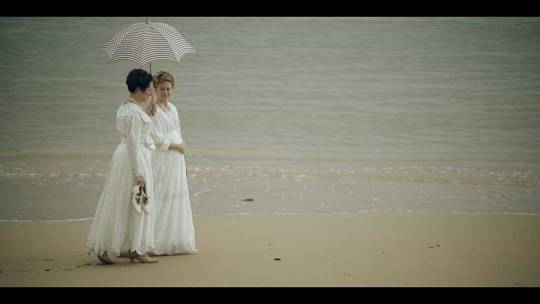
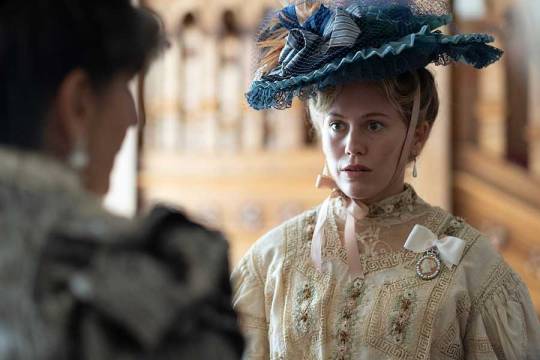


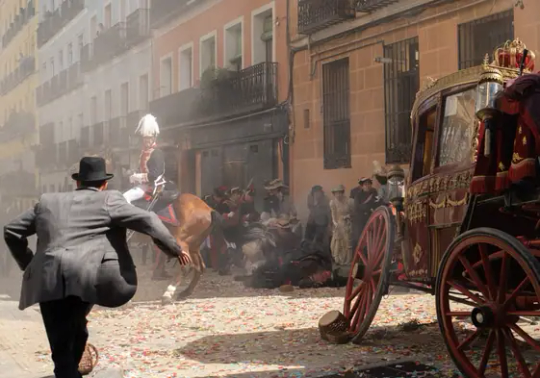
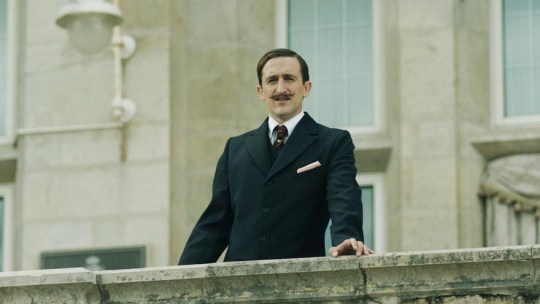


Upcoming series: Ena
In September, the filming of Ena began, a biographical series that will focus on the life of Victoria Eugenie of Battenberg, queen of Spain through her marriage to Alfonso XIII between May 31, 1906 and April 14, 1931, after being the monarchy deposed later by the proclamation of the Second Republic. Great-grandmother of the current king Philip VI of Spain, of whom she was godmother at his baptism. Throughout six chapters, the series will tell the life of Victoria Eugenie and at the same time offer a portrait of a time that changed the world, the first half of the 20th century, from 1905 to 1945. Born on October 24, 1887 in Aberdeenshire, Scotland, Ena was the daughter of Henry of Battenberg and Princess Beatrice, youngest daughter of Queen Victoria of the United Kingdom and Prince Albert of Saxe-Coburg and Gotha. Her godmother was Eugenia de Montijo, empress consort of France as Napoleón III's wife. The name of the series comes from what her friends and family called her since she was little, Ena.
The fiction is based on the novel of the same name by Pilar Eyre. Javier Olivares, who was behind the acclaimed Isabel and El Ministerio del Tiempo, will be the showrunner and plot manager for Ena. In addition to Olivares, the script is written by Isa Sánchez, Daniel Corpas and Pablo Lara Toledo. The series will be directed entirely by women: Anaïs Pareto, director of the series as a whole, in addition to four episodes, and Estel Díaz, who will direct two episodes.
“Ena is the portrait of historical moments that seem distant but are not so far away, because without them we would not understand the times we live in now,” Olivares declares in the press release sent by TVE. The writer and screenwriter remembers that Victoria Eugenie “fought to be happy in a bitter time, in which she witnessed two world wars, a civil war and a great pandemic, the tortuously called Spanish flu.”
For Pilar Eyre, author of the novel, she was "an extraordinary woman: cultured, supportive, liberal-minded, modern and very loyal." And she is excited because "finally all Spaniards can know" the story of a "misunderstood" woman. in their time, which they will always consider foreign." It is a fiction co-produced by RTVE with Ena La Serie AIE, La Cometa TV and Zona App. José Pastor, director of Film and Fiction at RTVE, has pointed out that "it is a "RTVE is proud to be able to portray this interesting historical character, from the point of view of two women directors and with Javier Olivares as showrunner, in one of its best series."
The Spanish actress of Anglo-Danish descent Kimberly Tell will play Ena and Joan Amargós will play Alfonso XIII. For her part, Elvira Mínguez will play Maria Christina von Habsburg-Lothringen, mother of Alfonso XIII. The cast is completed by Lucía Guerrero (Beatrice of Saxe-Coburg and Gotha), Raúl Mérida (Alfonso of Orleans and Bourbon), Juan Gea (Álvaro Figueroa y Torres, Count of Romanones), María Morales (María del Carmen Angoloti y Mesa, Duchess of Victoria), Pedro Mari Sánchez (Rodrigo de Saavedra y Vinent, Marquis of Villalobar), Luisa Gavasa (Eugenia de Montijo) and Joaquín Notario (José de Saavedra y Salamanca, Marquis of Viana)
Mariano Peña will play Miguel Primo de Rivera; Jaume Madaula will play the anarchist Mateo Morral, author of the attack committed at the royal wedding; Tomás del Estal will be Emilio María de Torres y González-Arnáu, and Ángel Ruiz will once again give life to Federico García Lorca, a character he already played in El Ministerio del Tiempo, among others.
The series will be filmed entirely in natural exteriors and interiors, like the Royal Palace of Madrid, the Palace of La Granja de San Ildefonso (Segovia), the Palace of Santoña (Madrid), the Palace of Fernán Núñez (Madrid), the Fort of San Francisco (Guadalajara) and the Magdalena Palace (Santander), built in 1911 by the City Council as a tribute to the monarchs and where Ena spent a good part of her summers in Spain, accompanied by the Royal Family. Filming for the series will continue until the end of December.
~~~~~~~~~~~~~~~~~~~~~~~~~~~~~~~~~~~~~~~~~~
So, the Magdalena Palace is going to be an important location during the series as a summer palace, the main filming location in Gran Hotel, and in that series Ena appeared in the episode 3×13, played by Aída Filx.
Apart from that, are we getting an Olivaresverse (XD)? Most likely not, and it's just references about his previous works as a showrunner, but there are connections between Isabel, Emdt and Ena: Michelle Jenner starring Isabel as Isabella I of Castile, then appearing in a couple of scenes in Emdt episode 1×04 and being an important figure in the lore as the foundress of the ministry (& Eusebio Poncela playing as Cisneros in both series, and also he played Cisneros in the film La Corona Partida and the Carlos Rey Emperador series); Alfonso XIII is a descendant of Isabella I of Castile; Ángel Ruiz appeard as Lorca in Emdt in 4 episodes and now he is on Ena playing as Lorca again, we don't know yet how much screentime he will get or which will his role be (secondary character most likely), but it's great to see more about him!
#Ena#period dramas#upcoming series#ena tve#victoria eugenie of battenberg#maria christina von hasburg#alfonso xiii of spain#kimberley tell#joan amargós#rtve series#pilar eyre#javier olivares#anaïs pareto#estel diaz#federico garcía lorca#ángel ruiz#elvira míngez#maria christina von hasburg-lothringen#lucía guerrero#beatrice of saxe-coburg and gotha#raúl mérida#alfonso of orleans and bourbon#juan gea#álvaro figueroa y torres#maría morales#maría del carmen angoloti y mesa#pedro mari sánchez#rodrigo de saavedra y vinent#luisa gavasa#eugenia de montijo
19 notes
·
View notes
Photo
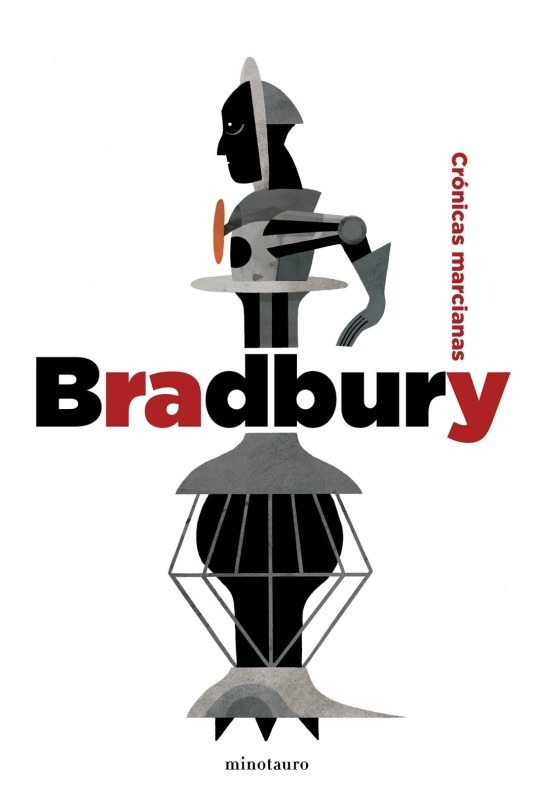
Ray Bradbury’s The Martian Chronicles, illustrated by Javier Olivares.
32 notes
·
View notes
Text

EL DIARIO MONTAÑÉS
0 notes
Text
Los pacientes del doctor García
Los pacientes del doctor García (Serie 2023)
#JavierRey #TamarNovas #VeronicaEchegui #JonOlivares #RaulJimenez #StephanieCayo
Mehr auf:
Serie / The Patients of Dr. GarcíaJahr: 2023-
Genre: Drama / History
Hauptrollen: Javier Rey, Tamar Novas, Verónica Echegui, Jon Olivares, Raúl Jiménez, Stephanie Cayo, Asier Flores, Carmen Molinar, Eduard Farelo, Martina Gusmán, Thomas Sauerteig …
Serienbeschreibung: Im Jahr 1936 ändert sich das Leben eines idealistischen Arztes in Madrid für immer, als er einem verwundeten Spion Schutz…
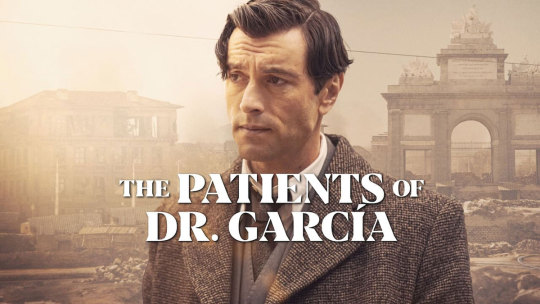
View On WordPress
0 notes
Text
Z2 Comics and Dee Snider Capture the Rocker’s Fight Against Censorship and the PMRC in the Original Graphic Novel, He's Not Gonna Take It
Z2 Comics and Dee Snider Capture the Rocker’s Fight Against Censorship and the PMRC in the Original Graphic Novel, He's Not Gonna Take It #comics #comicbooks
More than 35 years ago, Twisted Sister frontman Dee Snider marched into the United States Senate’s Committee on Commerce in a jean jacket and tank top to confront a band of concerned Washington housewives hellbent on silencing the howl of metal and beyond. Co-founded by Tipper Gore, a committee of politicians’ spouses labeling themselves the Parents Music Resource Center (PMRC) had lobbied to…

View On WordPress
#carlos olivares#dee snider#erik rodriguez#frank marraffino#graphic novel#graphic novels#hes not gonna take it#javier aranda#josh bernstein#roy burdine#steve kurth#twisted sister#z2 comics
1 note
·
View note
Text

RTVE is making a new show about Queen Victoria Eugenie of Spain called 'Ena' and I'm pretty impressed with the jewelry so far. This is meant to be Ena on her wedding day in 1906 presumably before the bomb went off. The show is being made by Javier Olivares who also made 'Isabel' about Queen Isabella I of Castile and is currently filming so it won't be out for a while. The jewelry used in shows and movies is never going to look exactly like the real thing unless they spend a ton of their budget on it which isn't going to happen but I appreciate it when they at least try to replicate jewels correctly.

Queen Ena's Fleur de Lys Tiara or as it's commonly called La Buena was made by Ansorena in 1906 as a wedding gift from her husband, King Alfonso XIII of Spain. It has become the most important tiara in the Spanish collection and is now worn by Queen Letizia.
115 notes
·
View notes
Text
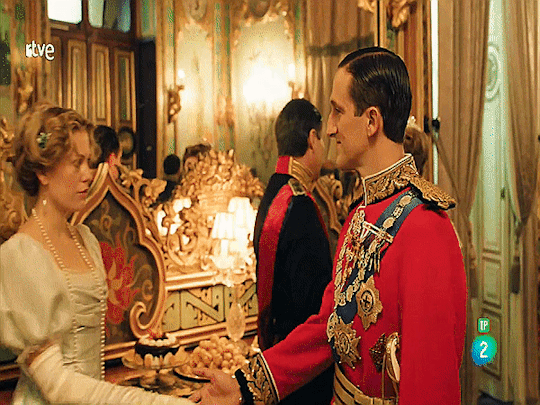
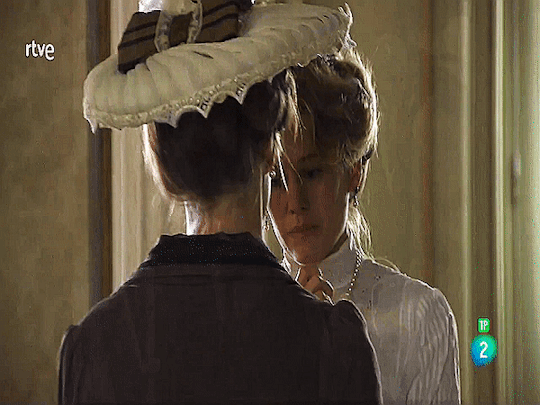
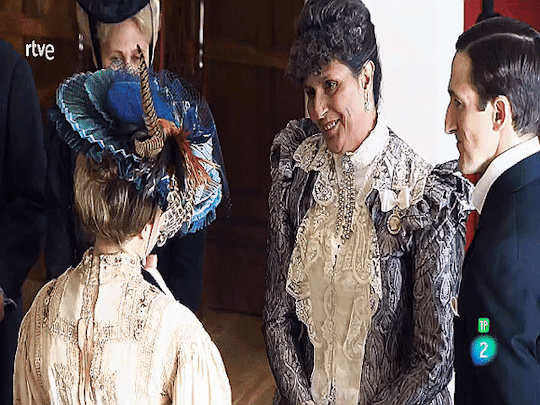
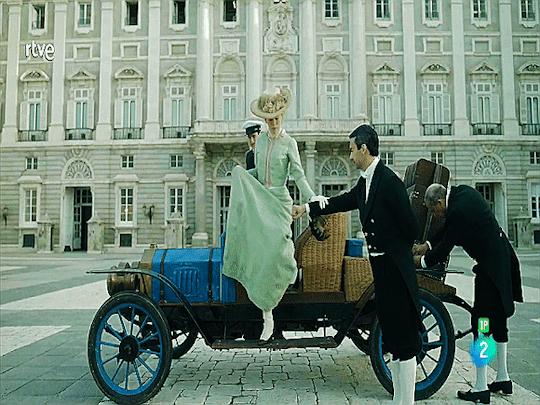


"is the story of a woman in a very difficult period, but it is also the story of an Englishwoman raised by Queen Victoria herself, with her own culture and her vision of the monarchy. If Alfonso XIII had listened to her more, perhaps our History would have been different. Personally, she had to learn Spanish on her own and deal with her children's hemophilia."
Javier Olivares, creator
ENA 2024
Kimberley Tell as Victoria Eugenie of Battenberg
Joan Amargós as Alfonso XIII of Spain
Elvira Mínguez as Maria Christina of Austria
#Ena#Victoria Eugenie of Battenberg#Alfonso XIII#Maria Christina of Austria#Ena of Battenberg#María Cristina de Austria#Victoria Eugenia de Battenberg#Kimberly tell#joan amargós#elvira mínguez
26 notes
·
View notes
Text

Vík í Mýrdal, Black Sand Beach,Reynisdrangar.
Javier Olivares
44 notes
·
View notes
Text
Time Is What It Is
Chapter I of The Ministry of Time
An unofficial novelization
Based on the screenplay by Javier Olivares and Pablo Olivares
Adapted by me :3
-
PRÓLOGO
Flanders, 1569
When the sun rose over the Belgian countryside, the battle— more accurately, the massacre— was already over.
Something had gone horribly wrong. The Spanish army was the most advanced in the world, handsomely financed, its tercio structure decades ahead of its time. And yet hundreds of dead men, almost exclusively soldiers of the Spanish army, were lying in the earth, the colors of their uniforms, faces, hands now the color of the mud. A team of men went around picking up the bodies. As they hoisted life after wasted life into their cart, they had to wonder to themselves— Who allowed this to happen?
At the site of the Spanish army’s camp, a Belgian castle conquered and occupied, the captain Fernández summoned his direct subordinate, Alonso de Entrerríos, to testify on the disaster on the battlefield. This meeting would have been routine, mundane, even constructive under different circumstances. Before the battle occurred, Fernández had it in his mind that he would meet with Alonso afterward to discuss what worked, what didn’t, and how to improve their strategy, whether to call for reinforcements, whether to advance even further. But now he knew the meeting he’d imagined would be impossible. Instead of sending a messenger to Alonso, telling him to report at his earliest convenience, Fernández sent two soldiers, armed, with orders to bring the man to him immediately— by force, if necessary. Fernández knew someone had to take the blame for the outstanding SNAFU, and if he knew one more thing, it was that it wasn’t going to be him.
The moment Alonso’s battered, mud-stained boots made contact with the Spanish army camp grounds, they suddenly found themselves escorted by guards to the room where the anxious officer waited. His back to the door, Fernández turned as he heard the sextet of boots enter the room.
‹Thou attackedst before it was time!› accused the captain. ‹Why didst thou do it?›
Alonso was a serious, once wiry but now emaciated man. Thirty and some years old, battle-weary, muddied and bloodied, he replied, ‹Because thou didst order it so.›
‹Hast thou witnesses who can attest to what thou sayest?›
‹If the dead could speak, I would.›
‹Thou liest,› said the captain, picking up a rod from the table behind him. He turned back to Alonso and yelled, ‹Thou liest!›
He moved to strike Alonso with the stick but Alonso grabbed it mid-swing and held it firm. Quietly but threateningly, Alonso replied, ‹I never lie.›
The captain looked at him as if he were mad.
‹Arrest him!› he yelled.
But before the soldiers could, Alonso grabbed the captain and exploded into rage. ‹They all died for thee!› he yelled. ‹All of them!›
The two guards could barely restrain the tall Alonso as he elbowed and kicked and bit with all his might. He knew there was no hope for him, but he had to do everything he could to give the traitorous Fernández what he deserved. One guard stepped away, and picked up a chair by the door. While Alonso was attacking the captain, he neglected to watch his back. The guard raised the chair and hit Alonso over the head. He fell to the ground, unconscious.
One month later, Alonso was in Seville, shackled to the wall in a gloomy dungeon. His uniform had been traded out for thin, worn rags, and his face was now hidden by the long, tangled beard and hair of a prisoner. Even so, he lowered his gaze. His wife, Blanca, had come to see him. She was upset, to say the least.
‹Why didst thou attack him? He was thy superior!›
‹There are times when a man must do what he must do,› said Alonso. He knew that if he had to live that day over again, and if there was no way he could prevent the catastrophic battle from happening, the only thing he would change would be to give Fernández one extra kick in the groin. Maybe two.
‹Damned pride…› said Blanca. She took his head in her hands. ‹Because of it, tomorrow thy captain will be in his bed, and thou on the gallows.›
‹Then on the gallows will be a man with honor, and in the bed a scoundrel.›
Alonso lifted his head, composing himself. He smiled tenderly at his future widow. ‹Blanca, cry not. I’ve had a good life. I saw the world… I loved… I fought for my country. I have no regrets.›
He paused for a moment. ‹Do one thing for me.›
Blanca nodded.
‹Continue thy life,› said Alonso, ‹don’t look back.›
Blanca hesitated. Alonso didn’t notice as she brought her hand to her belly.
‹Alonso… I… ›
Before she could finish the thought, the jailer yelled from outside the cell, ‹Your time’s up! Out!›
As the jailer entered the cell, Blanca looked at Alonso, and kissed him, empty of all hope. The jailer grabbed her and pushed her towards the door.
‹Forget me, I beg of thee,› called Alonso.
‹It won’t be easy,› said Blanca.
And then Alonso was alone. His head dropped back down, and he was absorbed in his own mind, until an unknown voice brought him back to Earth.
‹Art thou Alonso de Entrerríos?›
Alonso recomposed himself. In front of him was a monk, whose face was obscured by a black hood.
‹Thou wastest time, Father,› said Alonso. ‹What I have to say to God I’ll tell Him tomorrow in person.›
The monk took off his hood, revealing a serious, middle-aged face. He was clean-shaven, with eyebrows that seemed perpetually quirked— but this of course was not what Alonso would remember most about him. ‹I’m not here for confession,› said the monk. ‹I’ve come to take thee out of this place… if thou wilt accept mine offer.›
Alonso’s eyes widened.
‹Wouldst thou like to work for a secret office of the Crown?›
‹A spy?› said Alonso, perplexed.
‹Something like that. Special assignments in strange places… Thou wilt be dead to the world, including Blanca, thy wife.›
At this, Alonso lost the smile that had creeped its way onto his face… but all the same, he offered his hands so that the monk would free them. The monk had keys, and seeing Alonso’s gesture, he opened the shackles.
‹Thou must be very powerful,› said Alonso as the chains came off. ‹Knowing how much these people like executions, it’s strange to me that they would cancel this one.›
‹It won’t be canceled: they’ll have their execution.›
The monk whistled in the direction of the door. Through it, two guards dragged in someone bound with rope and with a sack covering their head. Alonso watched, and, rubbing his reddened wrists, asked.
‹Who is it?›
The monk said, ‹For all intents and purposes, thyself.›
Alonso doubted… but finally reached down to take the sack off the prisoner’s head: there on the ground, bound and gagged, was the captain Fernández. Alonso exploded into laughter, incredulous. The captive captain looked up at him in despair.
‹Can I stay to watch the show?› Alonso asked the monk.
The monk flicked his wrist, appearing to examine the tight-fitting bracelet he wore upon it. Alonso saw that one link on the bracelet was bigger than the rest— a dull green rectangle with mysterious marks on it absorbed the monk’s interest. Alonso could have sworn one of the marks disappeared and then appeared again in an instant. The monk concluded: ‹We don’t have time.›
‹What is that?› asked Alonso, still peering at the watch. The monk, no slave to explanation, walked out the open cell door.
‹Let’s go!›
Alonso, astonished, followed him.
-
Barcelona, 1880
As the afternoon wore on, Amelia started to worry that the professor giving the lecture she was attending did not know what he was talking about. Amelia had devoured books since she was a girl, fascinated by literature and history. She was the only woman in the room— in fact, the only woman in the university’s entire student body. Her presence at the university was a testament to the vast knowledge she had accumulated even before enrolling in her first classes. Unfortunately, not everyone there fully appreciated what she had to share.
The lecture was on the Golden Age of Spanish literature, and the lecturer seemed to be having trouble with the idea that works of high art might take inspiration from the lowbrow.
‹Overall, I deny the influence of any contemporary author on Lope de Vega, glory of Spanish letters,› the lecturer declared. ‹Because the former drinks from profane sources, and our Lope from the deepest roots of our faith…›
As the other students passed notes and shuffled papers, Amelia raised her hand, polite, but determined.
‹Yes, miss?› said the professor.
Amelia spoke fast, the words firing out of her like a machine gun. ‹I’m sorry, but the influence of Orlando Furioso on Lope de Vega is obvious, especially in the theme of madness in relation to love.›
The professor dismissed this. ‹Nonsense.›
‹Characters like Rodomonte and Orlando himself are taken as a model for Lope. You can see it in works like—›
The professor cut her off, coldly. ‹Will you let me continue with the class?›
Amelia stopped and, after a moment, shrank back into her chair, though she did not lower her gaze.
‹The Golden Age demonstrates the glory of our literature,› continued the professor, again at lecturing volume and cadence, ‹represented in Calderón, Lope, or Cervantes’ grandiose Don Quixote. A literature at the height of what Spain was then: the first world power…›
A note made its way unexpectedly to Amelia’s hand. She unfolded the paper and read it silently:
Amelia, come out to the hallway: it’s urgent.
She lifted her head, and the door to the classroom closed just as she turned to look. Not unalarmed, she gathered her notes, got up and hurried out to the hall.
What she found waiting for her there took her by surprise: a thin, attractive woman of about forty years, with blonde hair and a gaudy-colored dress. She had her back to the door, and as Amelia entered, the woman turned towards her and smiled eagerly, as if she’d been looking forward to meeting her for a long time. Amelia stared for no more than an instant.
‹Pardon… who are you?›
‹Someone who knows just how important you are,› said the mysterious lady. She added, ‹Not like all those men.›
Amelia found herself blushing.
‹I’d like to get to know one of the first university women in the country,› she continued.
‹Are you a journalist?›
‹Something like that,› said the woman. She reined in her smile. ‹Tell me, what did your mother say when you said you wanted to study here?›
‹She said I’d lost my mind,› said Amelia. ‹She doesn’t think women have any use for an education.›
‹And your friends?›
‹More or less the same. With them you can only talk about husbands, children, and the fashions of Paris. It’s hard to find a woman who you can talk to about art, politics, or important things.›
‹Well, times are changing, aren’t they?›
Amelia opened up like a book. ‹Sometimes I think that women are our own worst enemies. But that has to change. I’m convinced that in some future, women will be able to do the same as any man.›
‹So am I.›
The mysterious woman removed a flask from the small purse she clutched. She unscrewed the cap and said, ‹Shall we drink to that?›
She took a big gulp and offered the flask to Amelia, who took it, with a more timid sip.
‹If my mother heard us…› Amelia began. She shook her head. ‹She’s committed to finding me a husband… so that I marry and have children.›
This particularly piqued the woman’s interest. ‹And you don’t want to…?›
‹I don’t need a man,› said Amelia proudly.
The woman looked at her for a moment.
‹You don’t know the joy that that gives me…›
She moved in fast— and suddenly her lips were on Amelia’s. Amelia, for her part, was not experiencing the joy. She went stiff as a stone. The woman noticed her apprehension, and stepped back.
Flustered, Amelia stuttered, ‹Need— I don’t need men… but the case is I do like them.›
The woman looked at her and sighed.
‹Oh well.› She picked up her little purse. ‹Let’s see if this interests you more…›
She opened the bag again, and this time removed a wholly unfamiliar artifact. A black rectangle of glass, smooth and rounded at the edges, out of which colored light and soft, strange sounds emanated in response to the woman’s touch.
‹That… what is it?› asked Amelia.
The journalist who was not really a journalist pressed the strange shiny thing to her own ear. ‹Your world is too small for you, my dear— and that we can fix.› Turning away, she said to no one Amelia could see, ‹Angustias? Pass me over to the boss, darling…›
Amelia’s eyes were wide to begin with. Now she wouldn’t shut them for anything in the world.
-
Madrid, 2015
It was a typical night at a typical neighborhood bar. The local regulars drank their drinks, shot the breeze, watched the game playing on the TV mounted to the wall. On the wall behind the counter hung a scarf branded Atleti, for one of Madrid’s many soccer clubs, and a poster of Koke, one of its many famous players.
At a table, two paramedics in their yellow SAMUR uniforms dined on snacks and beer, attempting to wind down as the end of their shift approached. One of them was Julián. Only in his early thirties, he nevertheless had deep lines etched in his face and, tonight as on most nights, very little appetite. The other was Ramón. He was a little older, a lot heavier, and where Julián had short but poofy curls and a five-o-clock shadow, Ramón had a metalhead’s long greasy locks and well-kempt beard. While Julián stared into space, hardly having touched his little dish of nuts, Ramón picked at his tortilla de patata with the contempt of a hungry man confronted with food that is just not good.
‹Tortilla de patatas is like the IBEX-35 of a bar,› declared Ramón, referencing an index of the Madrid Stock Exchange. ‹If the tortilla is good, the bar is good.›
Julián didn’t answer.
‹And this tortilla is a disgrace.›
‹Everything was better before,› Julián said nostalgically.
‹Why are you so committed to coming here?›
Before Julián could make any unenthusiastic response, the radio transmitter they had rested on the table crackled to life: ‹Fire downtown,› said the staticky voice. ‹It’s a hostel.›
Julián got up automatically. ‹Let’s go.›
Ramón, still seated, started to protest. ‹Julián, for fuck’s sake, our shift is over in ten minutes and we’ve just been drinking!›
But Julián was already outside. With another curse, Ramón grabbed a handful of tortilla and grudgingly followed Julián out the door.
Downtown, the lights of sirens and the flames in the burning building colored the light of the night. By the time Julián and Ramón arrived in their ambulance, a fire truck and another ambulance had already been parked in front of the hostel. One firefighter, covered in ash, was being treated by a paramedic with an oxygen mask on the sidewalk.
Nearby, the light of the fire illuminating his face, was Ramón and Julián’s supervisor, talking to another firefighter in front of the building. Ramón approached them. ‹Jefe, how is it?› he asked his boss.
‹Not as bad as it seems,› he replied, with the attitude of having done most of his job already. ‹Inhalation of smoke, some attacks of nerves…›
As they talked, Julián looked up at the building, which was nearly completely engulfed in flame. Behind a window on the second floor, there were two figures.
Their characteristics were obscured by the smoke but Julián could see their silhouettes clear as day. ‹There’s still somebody inside!› he shouted.
‹Impossible,› said the firefighter. ‹Everyone has been evacuated. We’ve searched top to bottom.›
Julián pointed to the window, and the three other men looked up. But by then, the silhouettes were gone.
Nobody else was making any move to go into the building. Julián realized that if he was going to help those people in the window, he would have to do it on his own. He saw a firefighter’s smoke protection mask on the ground, grabbed it, and ran towards the building. His companions became alarmed. The firefighter yelled after him, ‹It’s about to cave in!›
But Julián didn’t turn back.
With the mask on his face, Julián entered the burning building and made for the stairs. At the top, he turned the corner into the room he saw through the window. Through the sooty mask he could see that the whole room was on fire and could collapse at any minute. Quickly his eyes searched for people in need of help. Then he saw, lying on the floor, two men— strangely, both were dressed like Napoleonic soldiers.
‹Here! I’ve found them!› Julián yelled. He went to try and revive them, but when he checked for a pulse, he couldn’t find one. He heard footsteps, and realized that someone else had entered the room. Thinking it was his partner, he yelled again. ‹Quickly! There’s no pulse!›
When he turned around, however, he saw that the new arrivals were not firefighters or SAMUR, but two other men, one uniformed like the men on the floor, and the other in civilian clothes of the same era. They stared at him, motionless, for a moment. Then there was a great cracking noise, and the three conscious men looked up. The ceiling had broken. The last thing Julián saw was the wooden beams heading right for his face.
-
For the next full day, Julián lay sedated in a hospital bed, coming in and out of consciousness. When he opened and closed his eyes, hours would pass before they opened again. Barely he perceived fragments of what was happening around him.
Open. A nurse is doing something Julián doesn’t get to observe. Close.
Open. Ramón, with he and Julián's supervisor, is at the foot of the bed. They talk in low voices.
‹This can’t go on, chief… Sooner or later something was going to happen. Nobody wants to work with him, he’s a danger, to others and to himself.›
The boss snorts.
‹After what happened with his wife…› says Ramón, ‹he’s not the same.›
‹Who would be?› The supervisor looks down at Julián. ‹Some shit luck you’ve had, kid…›
Close.
Open. Two strangers, dressed formally— a man in a suit and tie, and a woman in a blazer and skirt— are in the room. The man, next to the door, is reviewing a hospital clipboard, Julián’s medical history. The woman, seated by the bed, is looking at Julián.
Close.
-
The next day, Julián was fully awake, and the doctor told him he was free to go. Midday light entered through the window of the hospital room as Julián, now on his feet and dressed, prepared his bag to go home. He went over to the window to open it, but found that he couldn’t. It was locked.
‹Don’t bother. It won’t open.›
Julián turned around and saw his supervisor had entered the room.
‹Doctor’s orders,› said the boss.
Julián smiled. ‹They think I’m going to jump, or what?›
‹We’ve received a complaint from the Fire Department.› The supervisor was dead serious. ‹Many of their men risked their lives because you disobeyed an order from the firefighter in charge of the operation.›
‹There were people inside!›
‹There was only you, Julián,› said the boss.
He paused, to make sure Julián understood this point. Julián’s heart rate started to rise.
‹This isn’t the first time,› his supervisor continued. ‹Your colleagues say that working with you is like working with a suicide terrorist.›
‹But I know what I saw!›
‹You are out of service until further notice,› the boss said gravely. ‹You need to talk to a specialist…›
Julián sat down on the bed, crushed. The boss came over and put a hand on his shoulder.
‹Think of it as a vacation…› he said, more gently. ‹Didn’t you used to do photography? Do that.›
As his supervisor left the room, Julián replied under his breath.
‹Not anymore.›
17 notes
·
View notes
Text
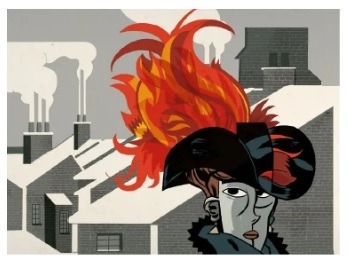
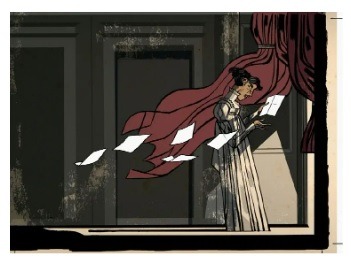


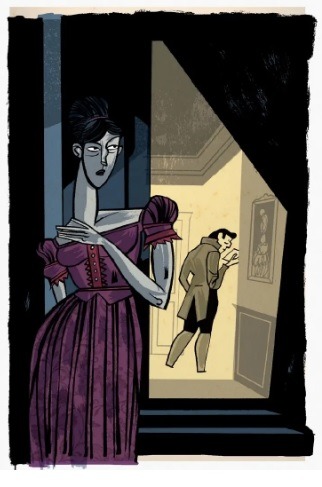
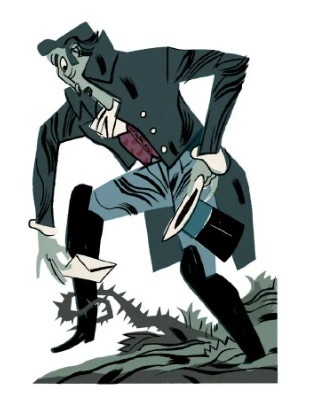
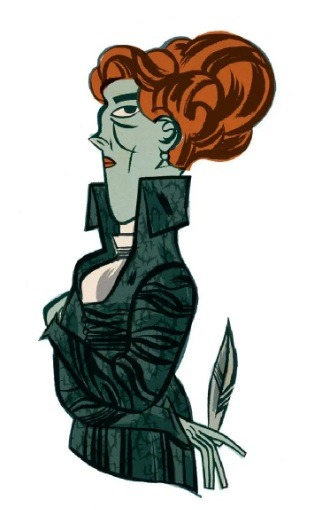
Lindas ilustrações da edição em espanhol de Lady Susan da Jane Austen! Feitas por Javier Olivares (@olivaresilustracion) Apesar de menos conhecido, Lady Susan é envolvente, hilário e meio chocante. Dizem que Jane Austen baseou sua anti-heroína em uma de suas concunhadas. Para saber mais é só ler aqui.
.
Amazing illustrations of Jane Austen's Lady Susan. By artist Javier Olivares (@olivaresilustracion)
#jane austen#lady susan#love and friendship#austen adaptations#pride and prejudice#lady susan vernon#p&pedit#sense and sensibility#jane austen juvenilia#elizabeth bennet#mr darcy#english literature#georgian era#xix century england#literature illustration
24 notes
·
View notes
Text
Clases de Seducción II, parte 16: Culpa
Temporada 1
Temporada 2: Parte 1, Parte 2, Parte 3, Parte 4, Parte 5, Parte 6, Parte 7, Parte 8, Parte 9, Parte 10, Parte 11, Parte 12, Parte 13, Parte 14, Parte 15
Sebastian y Matias tomaron un móvil del ejército que los estaba esperando en el aeropuerto de Arica para transportarlos hasta el regimiento.
Olivares ya no insistía en sacarle tema de conversación a Sebastian, y él lo agradecía. Sabía que después de todo lo que habían conversado, habían llegado a tal confianza entre ambos que los silencios ya no eran incómodos.
Al llegar al regimiento, Matias se presentó como el escolta de Sebastian, y los hicieron pasar a ambos a la oficina del Capitán Guerrero.
—¿Lo hizo pasar muchas rabias, Cabo? —le preguntó el Capitán a Olivares.
—No, Capitán —respondió con sinceridad Matías—. Él sabe que cometió un error, y está arrepentido.
Sebastian levantó la ceja levemente, sorprendido por las palabras de Matias, porque claramente estaba mintiendo: de lo único que estaba arrepentido era de haberle creído a su padre.
El Capitán resopló sonoramente, en señal de incredulidad ante las palabras de Matias, y miró directamente a los ojos a Sebastian, quien ya había recuperado su semblante inexpresivo.
—¿Es cierto eso, soldado? —le preguntó directamente.
Sebastian se demoró una milésima de segundo más de lo necesario para sonar convincente.
—Si, capitán —respondió finalmente.
—Parece que el pequeño paseo no le sirvió para sacar la voz de hombre y hablar fuerte, Guerrero —comentó con sarcasmo el capitán.
—Está cansado —lo defendió Matias—, no ha dormido nada desde hace dos días, me comentó.
—Bueno, se habría evitado ese problema si no se hubiese arrancado —argumentó con lógica el Capitán—. Como sea, muchas gracias por su servicio, Cabo Olivares —agregó, a modo de cierre de la conversación para despedir a Matias, y luego se dirigió a Sebastian—. Y usted, Guerrero, vaya a las barracas a darse una ducha y a vestirse. Lo espero en la armería en cinco.
Sebastian obedeció al capitán, y salió de su oficina apurando el paso. Al cabo de unos segundos se percató que el capitán no venía detrás de él y caminó con normalidad hacia las barracas.
—Oye —Sebastian escuchó la voz de Matias acercarse a él por la espalda—. Recuerda guardar bien lo que te pasé —le dijo, dándole unas palmaditas fraternales en el hombro, mientras disimulaba la falta de aliento.
—Gracias —Sebastian no atinó a decir nada más. Estaba abrumado por la amabilidad y empatía de Matías.
Olivares le sonrió, como indicándole que era lo mínimo que podía hacer, y luego dio la media vuelta y se fue.
Sebastian dio un suspiro de alivio, al saber que no estaba totalmente solo en el mundo. Aun había gente buena que valía la pena conocer y potencialmente a futuro poder llamar amigos.
Siguió caminando hasta llegar a las barracas, donde se dirigió rápidamente al baño para lavarse la cara y mojarse el pelo, y luego se fue al dormitorio, abrió su casillero y sacó su ropa de militar, aprovechando en el momento de guardar disimuladamente el celular que le había pasado Matías, envolviéndolo con un par de calcetines limpios. Se vistió rápidamente y al salir del dormitorio para dirigirse a la armería se cruzó con Andrés, quien lo saludó con alegría.
—¿Dónde estabas? —le preguntó, dándole un abrazo.
—Fui a comprar cigarros —respondió con sarcasmo.
Andrés se rió.
—Qué bueno tenerte de vuelta —le dijo el muchacho—. ¿Llegaste con Javier? —Sebastian negó con la cabeza—. Uy, su castigo va a ser más pesado entonces.
Como si a Sebastian le hubiese hecho falta ese comentario. El recordar que su amigo probablemente no volvería, y que tenía todo un castigo por delante, por su ausencia de dos días del regimiento le hizo revolver el estómago.
—Oye, hay algo que tienes que saber —le dijo Andrés, pero Sebastian no tenía ganas de seguir con la conversación.
—Sorry, Andrés, ¿podemos hablar después?, el capitán me está esperando —le dijo Sebastian, y sin darle tiempo para responder, se alejó del lugar.
Al llegar a la armería, estaba el capitán Guerrero junto a Ortega esperándolo.
—Guerrero, llega justo a tiempo —le dijo el capitán, con sorpresa, provocándole una leve sonrisa de satisfacción a Sebastian—. Sígame.
El Capitán comenzó a caminar por el amplio terreno del regimiento, sorprendiendo a Sebastian, que pensó que lo encerrarían en la armería a contar casquillos nuevamente, como la vez anterior.
Caminaron hasta una de las torres de vigilancia, que en la base tenía una puerta de metal cerrada con un candado. El Capitán le indicó a Ortega que abriera el candado y Sebastian esperó ansioso a ver qué había dentro.
Al abrir la puerta, desde donde estaba de pie, Sebastian solo vio profunda oscuridad, hasta que Guerrero iluminó una parte del interior con su linterna.
—Bienvenido a su dormitorio —le dijo el hombre, mientras alumbraba específicamente un viejo catre metálico sin colchón ni sábanas, con solo una gruesa malla de resorte del mismo material para soportar su cuerpo.
Aparte del catre, Sebastian solo pudo divisar que tanto el suelo como la pared eran de un color gris cemento, sin pintar.
Sebastian no dijo nada, e intentó mantener una expresión seria en el rostro.
—Aquí tendrá mucho tiempo para pensar en lo que hizo —comentó Ortega, y Sebastian lo odió por eso.
Lo que menos quería era pensar en todo lo que había pasado en las últimas 48 horas, el haberse escapado, con el único propósito de ver a Rubén, el enterarse que había tenido un accidente, y ser obligado a volver sin poder saber su estado. De todas maneras, aunque no lo quisiera, sabía que iba a pensar en todo eso durante la noche.
Guerrero le hizo una seña con la mano para que Sebastian ingresara a la habitación, y él obedeció. Cruzó el umbral de la puerta intentando acostumbrar la vista para descifrar qué más había dentro, pero la oscuridad se apoderó de todo el lugar rápidamente cuando Ortega cerró la puerta, y Sebastian solo pudo escuchar el candado cerrarse al otro lado.
Caminó lentamente en dirección hacia donde estaba la cama y se quiso sentar, sobresaltándose levemente al sentir el frío metal del catre. Dio un suspiro, y decidió tratar de descifrar qué más había en esa habitación. Volvió hacia la puerta y desde ahí comentó a caminar con ambas manos apegadas a la pared a modo de guía.
El corazón le dio un vuelco cuando sintió un chirrido al llegar a una de las esquinas del lugar. “Ratas”, pensó Sebastian, con un escalofrío recorriéndole la columna, justo en el momento que sintió que algo pasó por encima de su mano derecha, caminando por la pared hacia el suelo.
Sebastian dio un salto y se alejó lo más rápido que pudo de la pared, sacudiendo las manos y tratando de ubicar el catre, donde se recostó en posición fetal y con el corazón latiéndole a mil por hora, y con lágrimas cayéndole por los ojos, las que no tardaron en desencadenar un llanto real.
Rubén despertó con un profundo dolor en la mayor parte de su cuerpo. Apenas podía mover la cabeza gracias al cuello ortopédico, el que no evitaba que le doliera, y simplemente agregaba una gran incomodidad a su estado.
Pasó una pésima noche, entre dolores y sueños raros, no pudo conciliar el sueño como habría deseado para descansar de todo lo malo que había pasado en las últimas horas.
Se levantó a duras penas y salió de su habitación hacia el comedor, donde su padre estaba tomando desayuno con Darío, quien había llegado esa misma mañana desde Santiago.
Su hermano tenía los ojos llorosos y sonrió aliviado al verlo despierto. Darío se levantó con ímpetu y le dio un largo abrazo.
—¿Estás bien, enano? —le preguntó Darío, mirando cada moretón en las zonas visibles del cuerpo de Rubén, quien asintió, y usó toda su energía para esbozar una sonrisa—. No sabes lo asustado que estuve —le dio un abrazo con suavidad.
Rubén quiso decir alguna palabra para bajarle el perfil a todo el asunto, pero sabía que no tenía cómo, y que sería un estúpido por intentar hacerlo. Simplemente trató de responder con optimismo.
—Tranquilo, que al menos a mi no me pasó nada —dijo finalmente, algo avergonzado al saber que el regalo que le había hecho su padre había quedado prácticamente inutilizable.
Rubén se fue a servir un poco de cereal con leche fría, y se percató de la expresión de Darío, que tenía una actitud de querer ayudarlo, pero tampoco quería agobiarlo con su ayuda. Al menos eso intuía Rubén, y en el fondo lo agradecía. No quería que lo vieran como alguien frágil en ese momento. Seguía siendo funcional.
Mientras comía en silencio, pensó en el sueño que había tenido la noche anterior: “Vengo por Sebastian”, la frase en boca de una voz masculina que se repitió en sus sueños durante toda la noche.
Estaba seguro que el sueño estaba condicionado por la noticia que le había entregado su padre. Le había dicho la noche anterior antes de dormir que Sebastian lo había ido a saludar para su cumpleaños, pero ya había vuelto al regimiento, según lo que había dicho el padre de su amigo.
A pesar de todo, la frase de su sueño le generaba una sensación preocupante, como si ese “vengo por” fuese una especia de búsqueda para matar.
—Voy a ir a la casa del Seba —comentó Rubén, a ninguno en particular, tras llevarse a la boca la última cucharada de cereal.
Su padre levantó la vista, pero no dijo nada para impedirlo, aunque Rubén sintió que quería hacerlo. A pesar de lo que Jorge le había dicho, Rubén esperaba que el padre de Sebastian le hubiese mentido, y que en realidad Sebastian estaba en ese momento en su dormitorio, aun indeciso si ir a verlo finalmente o no.
—¿Quieres que te acompañe? —le ofreció Jorge.
Rubén negó con la cabeza, aunque luego dudó de su respuesta, al pensar que no sabía cómo podría moverse por un trayecto tan largo con muletas. Apenas sabía cómo usarlas.
Finalmente se mantuvo firme con su respuesta. Se las ingeniaría.
Prefería ir solo, y no interactuar con Sebastian frente su padre o su hermano.
Quería mucho ver a Sebastian. Deseaba verlo con todas sus fuerzas, pero casi todas esas ganas de verlo eran para enfrentarlo, para gritarle por haberse marchado en la forma que lo hizo, por haber terminado con su amistad de toda la vida por razones estúpidas y sin sentido, y por haberlo dejado sufriendo su partida, quitándole todos los buenos pensamientos que pudo haber atesorado de no haberse marchado de esa forma.
Rubén salió de la casa en dirección al domicilio de su mejor amigo, mientras Darío lo observaba desde la reja.
Al llegar a la casa de Sebastian, después de andar a duras penas con ambas muletas, abrió la reja aparatosamente y se acercó a golpear la puerta de entrada, como hacía siempre.
—Rubén, qué sorpresa —lo saludó el padre de Sebastian, con un muy falso tono cordial.
—¿Está Sebastian? —preguntó Rubén, esbozando una sonrisa a modo de saludo.
—Sebastian está en el regimiento, en Arica —le contó el padre.
—Mi papá me dijo que estuvo aquí el otro día —desafió Rubén. No iba a aceptar que le mintiera.
—Si, estuvo aquí antenoche —admitió el hombre—, pero como se había arrancado del regimiento, lo vinieron a buscar y se lo llevaron. Ayer vino tu papá y le conté lo mismo.
Rubén sintió una impotencia enorme. Después de haber estado tan cerca de verlo y de decirle todo el rencor que había guardado por meses, Sebastian se había marchado nuevamente.
—¿Y como supieron que estaba acá? —interrogó Rubén, algo molesto.
El padre de Sebastian soltó una risita burlona y despectiva.
—Es protocolo del regimiento ir a buscar a los que se fugan a sus domicilios particulares —argumentó.
Rubén se mordió el labio por la rabia. Tenía sentido lo que había dicho el padre de Sebastian. Y realmente no tenía pinta de que estuviera mintiendo. No le daba la impresión de ser una especie de psicópata que tendría a su hijo encerrado en algún dormitorio de la casa, atado de pies y manos y con una mordaza en la boca.
—¿Y no dejó nada para mí?, ¿ningún recado? —preguntó Rubén, aferrándose a la última esperanza que le quedaba para tener algún tipo de contacto con Sebastian.
—Nada —el hombre se encogió de hombros y negó con la cabeza.
Rubén miró fijamente a los ojos al padre de Sebastian, intentando buscar alguna señal de que estaba mintiendo, pero finalmente tras largos segundos de silencio, aceptó la realidad.
—Gracias —dijo finalmente Rubén, asumiendo que su mejor amigo ya no estaba en la ciudad, y ya era imposible hablar con él.
Dio media vuelta y salió a la calle nuevamente rumbo a su casa, con una velocidad bastante imprudente para haber recién empezado a andar con muletas, lo que le provocó un tropiezo mientras iba cruzando la calle, cayendo de bruces al asfalto.
—Cresta —murmuró con rabia, tomando una de sus muletas y lanzándola con fuerza lo más lejos posible.
Le dolía todo el cuerpo y estaba ahí tirado en mitad de la calle, humillado, solo.
Se quedó tirado por largos segundos, mirando el cielo despejado, intentando vencer las ganas de llorar por la rabia. Cuando pudo dominar sus emociones se puso de pie, tomó la muleta que tenía a su lado, y con dificultad se fue a buscar la que había lanzado lejos, que se había torcido por el golpe.
Al voltear la esquina de su casa, vio a Darío que lo seguía esperando, y no le dijo nada, solo sonrió aliviado al verlo regresar en buen estado.
Felipe salió de clases al mediodía y se fue rápidamente a la clínica donde sabía que estaba internado su padre.
Tenía un profundo sentimiento de culpa después de todo lo que había pasado, el accidente de Rubén, las discusiones que habían tenido, y por último la llamada que había hecho para que fueran a detener al amigo de Sebastian, evitando por todos los medios que Rubén tuviera algún tipo de contacto con su mejor amigo.
Intentó convencerse por mucho rato que lo había hecho por el bien de su pololo. Esa persona era un total desconocido, y su presencia en el hospital donde estaba internado Rubén podría significar un riesgo para él.
Sin embargo, muy en el fondo, tenía claro que lo había hecho por celos y egoísmo. Rasgos que no eran propios de él, o al menos eso prefería creer, así que se propuso tomar las acciones necesarias para enmendar las causas que le habían provocado actuar de la forma que lo había hecho últimamente, y determinó que la principal razón era la relación con sus padres.
Tomó la micro con premura al cruzar la calle de su liceo para no darle tiempo a la posibilidad de arrepentirse.
Se bajó de la micro a dos cuadras de la clínica, porque sabía que en esa calle vendían ramos de flores, ideales para subirle el ánimo a los pacientes que permanecían ingresados en el centro de salud.
Recorrió varios puestos donde vendían flores, sin poder decidirse por ninguna. Las encontraba todas muy bonitas, ideales para llevarle a su padre, pero no era capaz de comprar alguna. Sabía que su inconsciente estaba aplazando el momento de verlo, y abriendo la posibilidad de desistir de su decisión, y sin quererlo Felipe lo estaba permitiendo.
Pero fue fuerte. Y se mantuvo firme con su decisión.
Compró un ramo de margaritas sin importarle mucho el precio, y se dirigió con determinación hacia la clínica.
Al cruzar las puertas de acceso la duda se apoderó de él al no saber dónde estaría su padre. No tenía detalles del piso, habitación o unidad en la que se encontraba. Esa pequeña duda hizo tambalear su determinación, proponiéndose ir mejor otro día, cuando supiera exactamente dónde estaba.
No.
Iba a ingresar ese mismo día, en ese mismo instante.
Se acercó al mesón de recepción, procurando mantener una actitud segura.
—Buenas tardes, ¿sabe cómo puedo encontrar la habitación de mi padre? —le preguntó a la señora al borde de la tercera edad que atendía el mesón.
—¿Cuál es el nombre de su padre? —le preguntó la mujer, con atención.
—Guillermo Ramirez —respondió Felipe.
Le pareció raro decir el nombre de su padre en voz alta, considerando que era el mismo nombre que tenía él de nacimiento. Un nombre que hace años se había prometido enterrar y olvidar.
Después de un par de tecleos en el computador que tenía la señora en el mesón, y un par de llamados telefónicos para contactarse con la unidad, le indicó a Felipe que su padre estaba en el quinto piso, ala sur, habitación 510.
Felipe agradeció la amabilidad de la señora, y caminó con paso decidido hacia las escaleras, prefiriendo esa via en lugar del ascensor porque le daría más tiempo para pensar.
Subió peldaño a peldaño, tomándose su tiempo, con la mente dándole vueltas al hecho de que estaba a punto de ver a su padre voluntariamente, después de todo lo que había pasado. Pensaba que ya había dado por olvidada a su familia, o ex familia en ese caso, que ya había cortado todo tipo de conexión con ellos a raíz de la forma en que lo habían rechazado. Pero se dio cuenta que estaba muy equivocado, inconscientemente seguía teniéndolos presente en su interior, por mucho que odiara la idea.
Llegó al quinto piso y comenzó a recorrerlo sin mucho apuro, mirando las señales al costado de cada puerta para ver qué numero de dormitorio tenía, hasta que encontró la que buscaba: 510.
Felipe se asomó al dormitorio y notó que en el interior habían dos camas separadas por una cortina plástica. En la cama que estaba más cerca de la puerta había un anciano acompañado de quien seguramente era su esposa: ambos hablaban en bajo volumen tomados de la mano, y en sus miradas conectadas entre sí se podía apreciar el infinito amor que se tenían.
La segunda cama, que estaba al otro lado de la cortina y junto a la ventana, Felipe no veía quien la ocupaba y quien se encontraba de visita, pero estaba seguro que era la cama de su padre. De hecho, no había otra alternativa, ya que era el dormitorio que le había indicado la señora del mesón.
Ingresó a la pieza, saludó a la pareja de ancianos con cortesía, y caminó con paso decidido hasta la otra cama, donde había un hombre sumamente delgado y demacrado recostado de espaldas: era su padre.
Felipe quedó impactado por el aspecto físico que mostraba su padre, y el cambio radical que había tenido desde la última vez que lo había visto hace un par de semanas. La piel del rostro le marcaba la forma del cráneo, como si ya no tuviese nada de materia grasa para darle forma al rostro.
El hombre estaba acompañado de la madre de Felipe, un hombre de lentes ópticos vestido con pantalón de tela, camisa blanca y chaleco de lana (a quien Felipe no conocía, pero suponía quién podía ser), y una mujer que usaba una blusa floreada y pantalón de color café.
—Hijo —dijo su padre al verlo, con una leve expresión de sorpresa—, viniste.
Felipe asintió con seriedad, mientras su madre se ponía de pie para acercarse a él.
El hombre desconocido se aclaró la garganta para llamar la atención.
—Mucho gusto, soy el Pastor Ortiz —se presentó el hombre—, y ella es mi esposa, Marta.
Felipe asintió serio, incómodo por la presencia de aquel hombre que se quiso presentar antes de permitirle hablar con su propia madre.
—Yo soy Felipe —dijo sin dar más detalles, y por la reacción del pastor, que se esforzó por ocultar su cara de desagrado, Felipe se dio cuenta que sabía perfectamente quien era él: el hijo homosexual.
—Marcela —dijo el pastor dirigiéndose a la madre de Felipe—, creo que, para asegurar la salvación de Guillermo, es mejor evitar el contacto con las fuentes de pecado.
—¿Qué? —preguntó molesto Felipe.
Había entendido perfectamente qué había querido decir: Él era a los ojos de ellos la fuente de pecado, que podría poner en riesgo el destino celestial de su padre si es que se atrevía a perdonarlo.
La madre de Felipe se volteó a ver a su esposo sin decir una palabra. Después de unos segundos de comunicación no verbal, la mujer se volvió a sentar en la silla contigua a la camilla sin mirar a los ojos a Felipe.
—¿Esto es en serio? —preguntó enfurecido Felipe—, ¿y quien chucha se cree que es usted para venir a decidir a quienes puede ver o no mi papá?
—Es el Pastor jefe de la Iglesia…
—Me importa un pico que sea el mismísimo Papa —Felipe interrumpió a su madre—. El viejo se está muriendo.
—Guillermo, compórtate que tenemos visitas —lo retó su madre poniéndose de pie nuevamente, refiriéndose al pastor y su esposa—. Es un sacrificio que debemos hacer por la salvación de tu padre. No puedo creer que seas tan egoísta…
Felipe estaba sin palabras. Tenía un nudo en la garganta tan fuerte que le provocaba dolor físico, y pensó que incluso podía ser visible para los demás. Miró a su padre quien le devolvía la mirada triste, pero resignado.
—¿Yo soy egoísta? —desafió a su madre con sus propias palabras—, ¿eres tan cara de raja de decirle eso al hijo que abandonaste cuando tenía quince años?
—Tu sabes que lo que insistes en hacer está mal —argumentó la mujer.
Felipe miró fugazmente al pastor, quien tenía una mueca de satisfacción en el rostro, como si se sintiera orgulloso de lo que estaban haciendo los padres de Felipe.
—¿Y tú no piensas decir nada? —le preguntó a su padre, quien simplemente se encogió de hombros.
—Hijo, no me quiero ir al infierno —se excusó el hombre.
Con esas palabras Felipe sintió como una puñalada en el pecho. No podía creer que, después de todo lo que había pasado entre ellos, y ahora con la enfermedad de su padre, siguieran prefiriendo sus creencias por sobre su propio hijo.
La situación le provocaba mucha pena, pero se obligó a no llorar, y producto de reprimir esa emoción, la furia empezó a dominar su estado de ánimo.
—Lo único que queremos es que recapacites —intervino su madre
Felipe no quiso escuchar más a su madre, y la interrumpió acercándose a su padre, evitando el bloqueo de su madre.
—Deseo de todo corazón que te vayas al infierno —le dijo a su padre, mirándolo a los ojos, lleno de furia—. Tú y todos ustedes —se dirigió a todos los presentes.
El rostro de su padre se desfiguró por la pena, mientras que su madre se llevó las manos a la boca sin poder creer lo que su hijo había dicho.
Felipe salió de la habitación con el ramo de flores en la mano, pero se devolvió casi de inmediato para entregárselo al compañero de cuarto de su padre.
—Espero le guste —le dijo al desconocido, con un tono bastante agresivo.
La anciana estiró la mano para recibir las flores.
—Muchas gracias, hijo —le dijo la mujer, con expresión de lástima, mientras que el anciano dijo lo mismo, pero apenas audible.
Felipe no dijo nada más, bajó la mirada y se marchó.
Bajó corriendo las escaleras, para alejarse de ahí lo más rápido posible. La rabia y la pena lo estaban inundando y no quería llorar ni liberar la furia con violencia.
Salió de la clínica chocando con la gente a su paso, todo con el afán de abandonar el lugar con rapidez, como si acabara de plantar una bomba y necesitara arrancar antes de que explotara.
Hizo parar la primera micro que vio pasar en la calle, y se subió sin importarle el recorrido.
Felipe pensó que era una pésima persona, y sobre todo un pésimo hijo. Desearles el infierno a sus padres era lo peor que podría haberles dicho. Se arrepintió casi de inmediato por haberlo dicho, pero la rabia fue más fuerte.
“Merezco que me pasen todas las cosas malas de mi vida” pensó. Por eso sus padres lo habían abandonado. Tuvieron buen ojo, él no era una buena persona, por mucho que había intentado ser un joven maduro y bueno, simplemente su maldad era demasiado grande para permanecer oculta, que incluso llegó a manchar su relación con Rubén.
Felipe se bajó de la micro lo más cerca posible de la casa de Rubén. Tenía que verlo. Necesitaba verlo.
Con el corazón acelerado y la respiración entrecortada, caminó más de diez cuadras hasta la casa de su pololo y gritó desde la reja para anunciar su llegada.
—Vengo a ver al Rubén —le dijo Felipe a Jorge apenas salió a abrir la puerta.
—El Rube está durmiendo —le dijo su suegro—. Y la verdad dijo que no quería ver a nadie.
Felipe se sorprendió por lo que escuchaba.
—¿En serio? —preguntó, intentando ocultar su decepción—, ¿incluso yo?
Jorge asintió.
—Necesita descansar —le explicó Jorge—, descansar de verdad, después de lo que pasó.
Felipe asintió resignado.
—¿Te puedo pedir un favor, Jorge? —le preguntó Felipe, sintiendo unas ganas incontrolables de gritar por la impotencia—. ¿Me avisas cuando Rubén esté listo para recibir visitas, para venir a verlo?
—Por supuesto Felipe —respondió su suegro.
—Y otra cosa —Jorge escuchó atento—. Dile al Ruben que lo amo.
La ultima palabra salió un poco débil, quizás por el hecho de que nunca se la había dicho a Rubén, o porque sentía que las energías de su cuerpo se estaban acabando, pero una cosa era segura: realmente lo sentía.
Felipe se dio media vuelta y comenzó a caminar resignado a su realidad. Su pololo no quería verlo, justo en el momento que más lo necesitaba. Aceptó su destino, por la culpa que sentía por haber actuado tan mal en el último tiempo. Estaba pagando todo el daño que había hecho.
Después de enterarse que Sebastian había vuelto al regimiento, Rubén se sintió aun más desganado de como ya se sentía antes.
“Me voy a acostar, estoy cansado” le había dicho a su hermano después de explicarle que no había podido ver a su mejor amigo.
Su energía solo le permitió fingir buen ánimo para su hermano y su padre, pero por eso mismo evitó mantenerse en el comedor conversando con ellos.
Se acostó en la cama mirando el cielo raso de su dormitorio, pensando en lo poco oportunos que habían sido todos los hechos ocurridos los últimos días.
Intentó convencerse que, quizás había sido para mejor: después del accidente sentía un impulso incontrolable de complacer a los demás, de mantener una fachada de optimismo y vibras positivas, producto de la culpa y vergüenza que le provocaba haber tenido el accidente. No quería mostrarse deprimido o pesimista frente a su padre o hermano, y tampoco quería hacerle sentir a su pololo que había sido su culpa.
Pero con Sebastian era distinto. Quería que supiera lo molesto que estaba con él por la forma en que se había marchado, lo mucho que había sufrido con su partida.
Cuando despertó de una siesta de un par de horas, Rubén le dijo a su padre que no quería ver a nadie. Se sentía cansado física y mentalmente por todo lo que había pasado últimamente: sus peleas con Felipe, el accidente, la pérdida del automóvil en que su padre había trabajado por años. Por eso mismo necesitaba estar solo.
—Necesito descansar bien —argumentó Rubén, y su padre sin agobiarlo a preguntas aceptó su decisión.
—Igual quiero que sepas que estamos para lo que necesites —le hizo saber su padre.
Rubén siguió acostado en su cama, soportando los dolores que seguía teniendo en todo el cuerpo, y sintiendo ansiedad cada vez que pensaba que quizás esa posición en la que estaba acostado le podría hacer quizás más daño que bien.
Sebastian escuchó la puerta del dormitorio abrirse de par en par. No había dormido prácticamente nada, escuchando demasiado cerca los chirridos de lo que pensaba eran ratas, e intentando aguantar el frío que hacía en ese lugar.
El cielo aun estaba oscuro así que supuso que aún era más temprano de las seis de la mañana.
—Soldado Guerrero, puede ir a las barracas a asearse —le indicó Ortega, de quien solo divisó su silueta.
Sebastian se levantó y sin responderle salió del lugar y se dirigió a las barracas, donde sus compañeros seguían durmiendo. Pasó al baño a lavarse las manos y la cara, y luego se fue a recostar a su antigua cama, para ver si podía recuperar algo del sueño perdido. Sin embargo, apenas apoyó la cabeza en la almohada, las bocinas comenzaron a sonar dentro del dormitorio anunciando la hora de levantarse.
Se levantó nuevamente y vio que todos sus compañeros hacían lo mismo que él, con mucho más ánimo. Miró hacia la cama de Javier, que obviamente estaba vacía, y sintió un poco de pena al recordar que no estaba ahí con él. Luego miró hacia donde dormía Simón y se dio cuenta que tampoco estaba ahí. Se preguntó qué le había pasado, y asumió que estaba en la guardia nocturna, y que se sumaría al resto en la formación de la mañana, pero no apareció.
—Tuvo un ataque de pánico, creo —le respondió Andrés cuando Rubén preguntó dónde estaba Simón.
—¿Cómo?, ¿Tuvo uno?, ¿o crees que tuvo uno? —presionó Sebastian para obtener una respuesta concreta.
—Es que nunca supimos qué pasó. Una noche le tocó hacer la guardia, como casi siempre, y al otro día ya no estaba. El capitán dijo que fue un ataque de pánico, pero en verdad varios dudan que haya sido eso.
—¿Y tú qué crees que le pasó? —Sebastian quiso saber su opinión.
—Yo creo que el Capitan nos dijo la verdad —respondió Andrés, y Sebastian pensó que su opinión era bastante predecible.
Sebastian no le preguntó a nadie más al respecto porque simplemente no tenía ganas de hablar con nadie. Sentía que todo su mundo se estaba desmoronando lentamente: estaba solo en el regimiento, con la incertidumbre del estado de salud de Rubén, y ahora con el desconocimiento de la situación de Simón. Solo esperaba que tanto Rubén, como Simón y Javier estuvieran bien y a salvo.
A pesar de todo, su preocupación por Rubén era lo principal. Sabía que había tenido un accidente automovilístico con potenciales consecuencias mortales, mientras él estaba encerrado en el regimiento.
Se escabulló hacia el dormitorio en las barracas todas las veces que pudo durante el día para revisar el celular que le había pasado Matías, en busca de algún mensaje con novedades sobre Rubén.
—Hasta que volvió La Novia Fugitiva —comentó Julio a las espaldas de Sebastian, haciendo que se sobresaltara.
Eran cerca de las seis de la tarde, y la hora de la cena se acercaba.
Sebastian se dio media vuelta y vio a Julio, Luis y Mario mirándolo desde la puerta del dormitorio, que acababan de cerrar tras ellos.
Se puso nervioso. Había evitado hablar con ellos durante todo el día porque no los soportaba: eran unos matones homofóbicos que ni siquiera se esforzaban en ocultarlo.
—¿Qué pasó?, ¿te comieron la lengua los ratones? —le preguntó Julio, buscando una respuesta, provocando las risas forzadas de sus dos amigos.
Sebastian se puso serio y no respondió, se dio media vuelta dándoles la espalda, guardó el calcetín con el celular en el fondo del casillero, y luego cerró la puerta de su casillero.
Se volvió para salir del dormitorio, pero el trío de idiotas estaba a menos de metro y medio de distancia de él, sobresaltándolo porque ni siquiera había escuchado sus pasos acercarse.
—¿Qué tenías ahí? —preguntó Mario con prepotencia.
—¿Qué te importa? —respondió Sebastian, sintiendo una breve ráfaga de euforia.
“No son más que tres pobres idiotas que hablan mucho pero no hacen nada. Perro que ladra no muerde”, se decía Sebastian en su mente.
—Esas no son formas de responder —le dijo Julio acercándose, y Sebastian aprovechó la oportunidad para evadir el contacto físico y pasó por su lado, derecho hacia la puerta—, ¿o acaso quieres terminar como la Simona?
El corazón se le detuvo a Sebastian. Las palabras de Julio indicaban que la ausencia de Simón se debía a que le habían hecho algo. La rabia se apoderó de sus impulsos, y se acercó rápidamente para enfrentar a Julio.
—¿Qué le hiciste a Simón? —le preguntó, quedando a escasos centímetros del rostro de Julio.
Los tres matones soltaron una risa burlesca.
—¿Qué crees que le hicimos? —le preguntó con sorna Luis.
—Es interesante igual lo vulnerable que queda la gente cuando se les va su guardaespaldas —comentó Mario con sarcasmo.
—Cuando los maricones se quedan sin defensores, es súper fácil sacarles la chucha, a tal nivel que son físicamente incapaces de decir qué pasó realmente —añadió Julio.
Sebastian se imaginó a Simón internado en un hospital, completamente desfigurado, imposibilitado de hablar.
El corazón se le aceleró tanto que pensó que los matones lo escucharían desde la distancia en que estaban. Su cuerpo temblaba de terror, y quedó completamente paralizado, incapaz de responder, o de siquiera aventar un golpe a alguno de los abusadores.
—Así que ten harto cuidado, princesa —continuó Julio, dándole una palmada agresiva en el trasero a Sebastian, que se mantenía inmóvil—, porque en cualquier momento te toca a ti.
Sebastian se mantuvo dándole la espalda a la puerta, escuchó cómo la abrían para salir, y el murmullo de las voces lejanas de los demás soldados entró de forma casi inmediata.
Bajó la cabeza, y miró sus manos que estaban empuñadas y le ardían. Las levantó tembloroso, mientras lágrimas de impotencia y miedo caían por su rostro. Abrió los puños y las palmas las tenía bañadas en sangre. Había presionado con tanta fuerza que se había herido con sus propias uñas.
Se dio media vuelta para mirar hacia la puerta, para comprobar que Julio, Luis y Mario ya se habían ido: efectivamente se habían marchado, y él se encontraba completamente solo.

#el diario de larry#eldiariodelarry#gay#relato gay#gay kiss#gay men#gay guys#lgbt#lgbtq#gay boy#gay couple#pareja gay#beso gay#literatura gay#gay chile#chile gay
36 notes
·
View notes
Text
youtube
Recently the YouTubers Dragon Blade Media and Delorian Milenario have interviewed Javier Olivares, showrunner, co-creator, producer or screenwriter of some well known series like El Ministerio del Tiempo, Isabel, Víctor Ros, Ena, among other ones.
I'm posting it here if anyone is interested.
Subtitles in other languages are available, if you need English subtitles the transcription is more or less good. These are the sections of the video:
00:00 Intro
01:00 How was your life like before you were a screenwriter?
06:10 First projects in the audiovisual sector
16:15 El Ministerio del Tiempo and European productions
21:40 El Ministerio del Tiempo as transmedia
26:50 Judgment against Timeless/ Legends of Tomorrow and Loki
35:10 Could the series return?
41:40 Is there the possibility of any special if it returns?
45:45 Tell us about Ena
52:35 Other projects
1:03:00 AI and strikes in Hollywood
1:05:00 European public productions vs subscription
#videos#interviews#javier olivares#deloreanmilenario#dragonblademedia#el ministerio del tiempo#emdt#isabel tve#series#ena tve#Ena#víctor ros#Youtube
5 notes
·
View notes
Note
Holi!
Ángel Ruiz va a volver a interpretar a Lorca en una nueva serie. La serie es Ena, sobre Victoria Eugenia de Battenberg (la mujer de Alfonso XIII), y estará ambientada entre 1905 y 1945. Está basada en un libro de Pilar Eyre, y el showrunner es Javier Olivares (sí, creo que Olivares se ha quedado con las ganas de contar más cosas sobre Lorca después de Emdt)
OOooh GOOD FOR HIM !!! La verdad es que fue increíble haciendo de Lorca en EMDT, no puedo imaginarme otro actor mejor
2 notes
·
View notes
Photo

EL DIARIO MONTAÑÉS
1 note
·
View note
Text
Victor Zoco and El Ministerio del Tiempo
In his article titled “Futurism without a Future: Thoughts on The Ministry of Time and Mirage”, Victor Zoco analyzes the television series El Ministerio del Tiempo, created by Javier and Pablo Olivares. In this article, Zoco analyzes the science fiction “protopia” presented and calls the show a very successful “neo-conservative experiment”, citing its stern maintenance of the capitalist realist status quo and its stark lack of potency to create new futures outside of what we currently know. Citing Franco Berardi and referencing Deleuze, Zoco defines this impotency as an inability to see possible alternatives to the seemingly inescapable present that we know. Although this is an accurate assessment of the series, I would complicate this point further by asserting that El Ministerio del Tiempo does not have an inability to see possible alternatives but rather is narratively structured around eliminating the very eventualities of what Deleuze called singularities. El Ministerio del Tiempo does not simply present a “tabula rasa” as Zoco posits but goes a step further and wholly centers its narrative structure around the characters and institutions that are actively fighting to maintain the capitalist realist status quo and flattening out the proverbial tablet that would, without intervention, become rough with potential singularities. As such, El Ministerio del Tiempo is not only a successful conservative experiment but a demonstration that our collective cultural imagination of possibilities has indeed inched closer towards a “tabla rasa”, dwindling of potential singularities that would challenge the status quo.
#oxyspeculativetv @theuncannyprofessoro
5 notes
·
View notes
Text


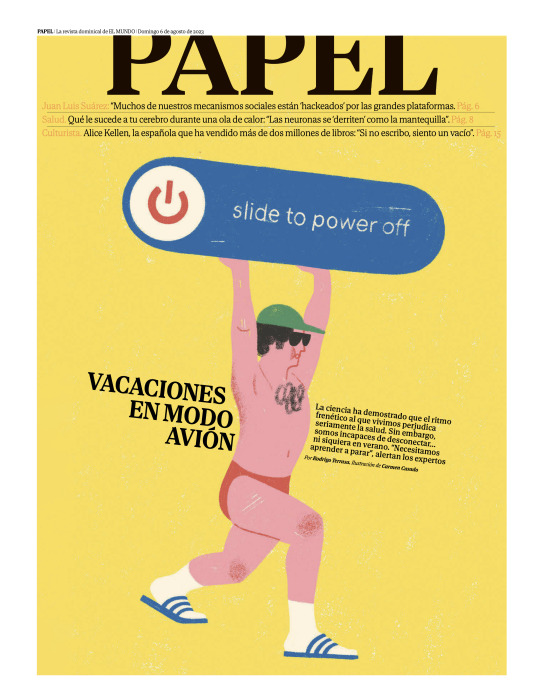
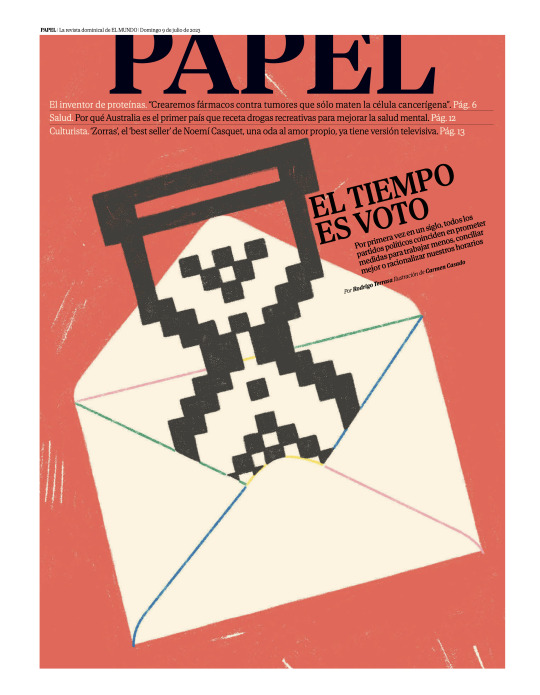

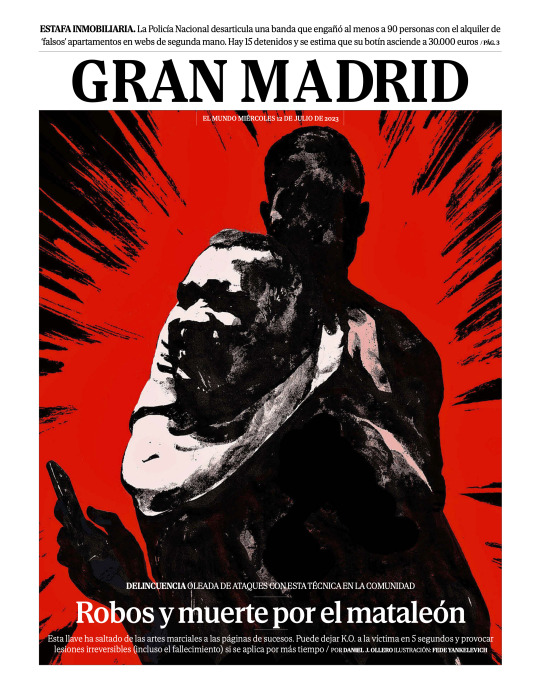

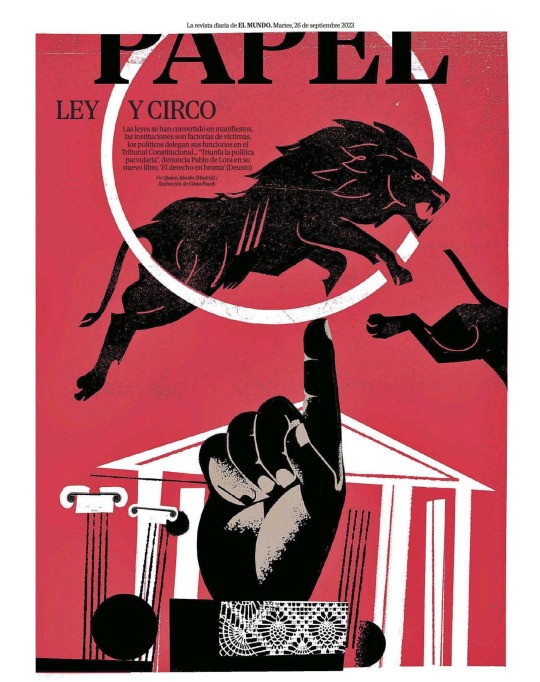

⩔
La actualidad se ha llevado por delante alguna de nuestras rutinas, como la de destacar las mejores portadillas publicadas en los suplementos de El Mundo a lo largo de este tercer trimestre del año. Un repaso que desde 2014 veníamos haciendo mensualmente pero que este año hemos tenido que reducir debido a que se ha dejado de utilizar este recurso en el periódico de forma diaria.
En este compendio destacamos los trabajos de Raúl Arias, Carmen Casado, Ulises Culebro, Fede Yankelevich, Javier Olivares y Cinta Fosch.
» El Mundo, del 7, 9, 12, 21 y 23 de julio; 6 y 27 de agosto y 3 y 26 de septiembre de 2023
…
« Anterior repaso: abril-junio 2023 · Repaso siguiente: octubre-diciembre 2023 »
1 note
·
View note